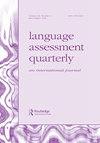Technology-Enhanced Items in Grades 1–12 English Language Proficiency Assessments
IF 2.8
2区 文学
0 LANGUAGE & LINGUISTICS
引用次数: 2
Abstract
ABSTRACT Technology-enhanced items (TEIs) are innovative, computer-delivered test items that allow test takers to better interact with the test environment compared to traditional multiple-choice items (MCIs). The interactive nature of TEIs offer improved construct coverage compared with MCIs but little research exists regarding students’ performance on TEIs versus MCIs in English language proficiency (ELP) assessments. This study examines the performance of Grades 1–12 English learners (ELs) on TEIs and MCIs in an online reading test. The test included TEI and MCI content-matched pairs that shared the same reading input but differed in response mode. We analyzed 1.2 million ELs’ scores across five different grade-level clusters: 1, 2–3, 4–5, 6–8, and 9–12. Items were evaluated for difficulty, discrimination, and information using Item Response Theory. Additionally, efficiency was investigated using the amount of information provided and item duration. TEIs were slightly more difficult than MCIs, but they did not differ in discriminative power. Notably, TEIs were more informative for ELs at higher grade or reading proficiency levels. TEIs generally had longer item durations than MCIs, making them less efficient, except for at Grades 6–8. Results provide insights for developing TEIs for ELP reading assessments.1-12年级英语能力评估中的技术强化项目
技术增强型试题(TEIs)是一种创新的、由计算机提供的试题,与传统的多项选择题(MCIs)相比,它能让考生更好地与考试环境进行互动。与MCIs相比,TEIs的互动性提供了更好的结构覆盖,但很少有关于学生在英语语言能力(ELP)评估中TEIs与MCIs的表现的研究。本研究考察了1-12年级英语学习者在在线阅读测试中TEIs和MCIs的表现。测试包括TEI和MCI内容匹配对,它们共享相同的阅读输入,但反应模式不同。我们分析了120万名学生在5个不同年级的得分:1、2-3、4-5、6-8和9-12。使用项目反应理论评估项目的难度、辨别性和信息。此外,使用提供的信息量和项目持续时间来调查效率。tei的难度略高于mci,但在判别能力上没有差异。值得注意的是,tei对成绩较高或阅读水平较高的英语学习者提供了更多的信息。除了6-8年级外,tei通常比mci的项目持续时间更长,使其效率更低。结果为开发用于ELP阅读评估的tei提供了见解。
本文章由计算机程序翻译,如有差异,请以英文原文为准。
求助全文
约1分钟内获得全文
求助全文

 求助内容:
求助内容: 应助结果提醒方式:
应助结果提醒方式:


